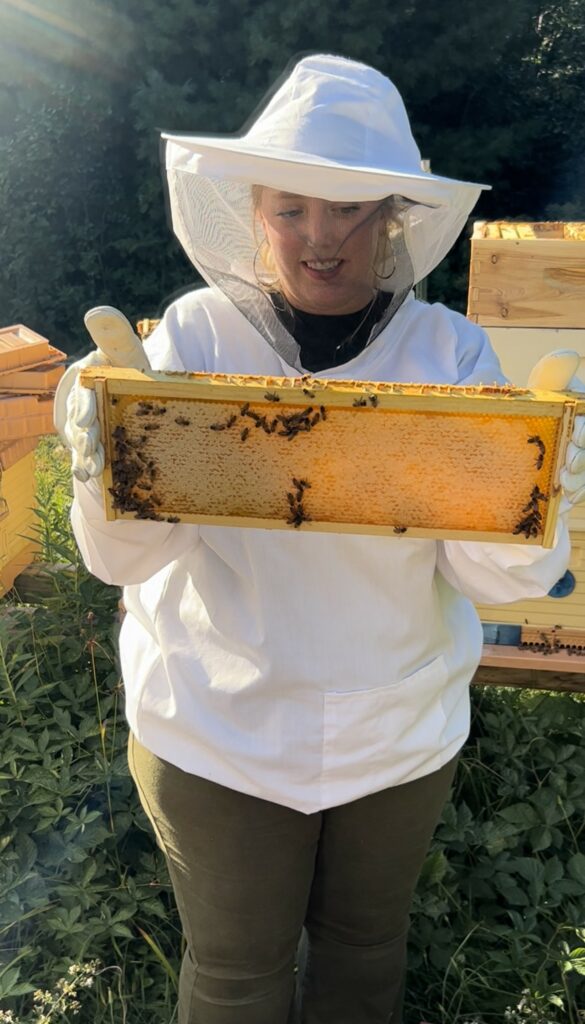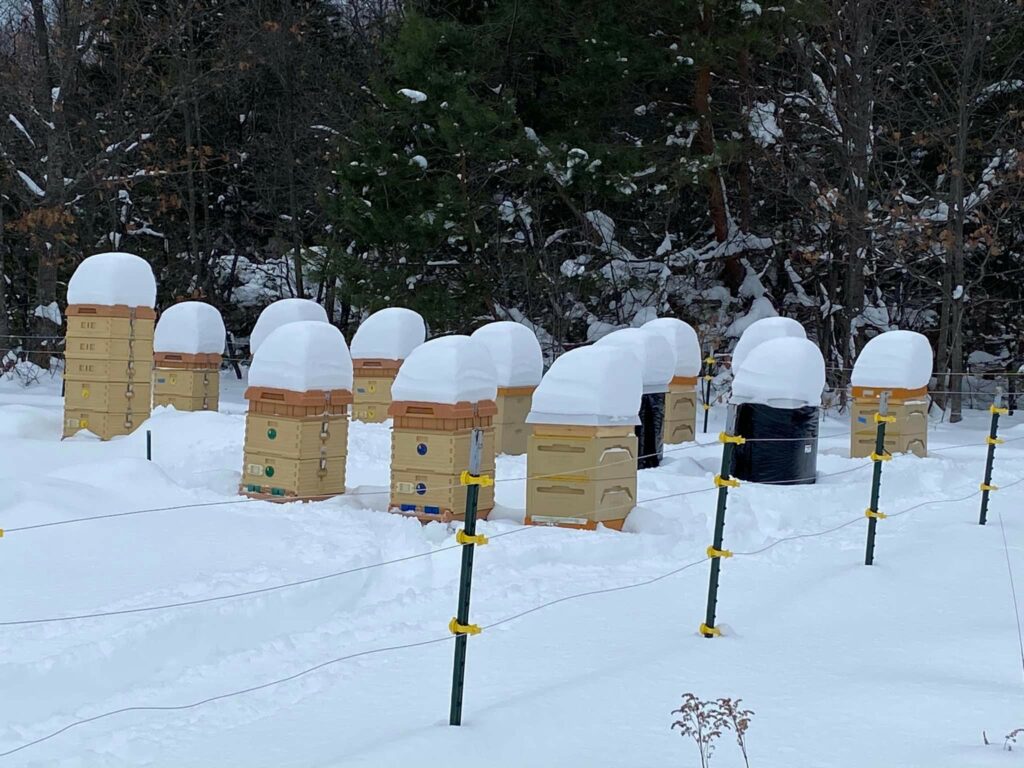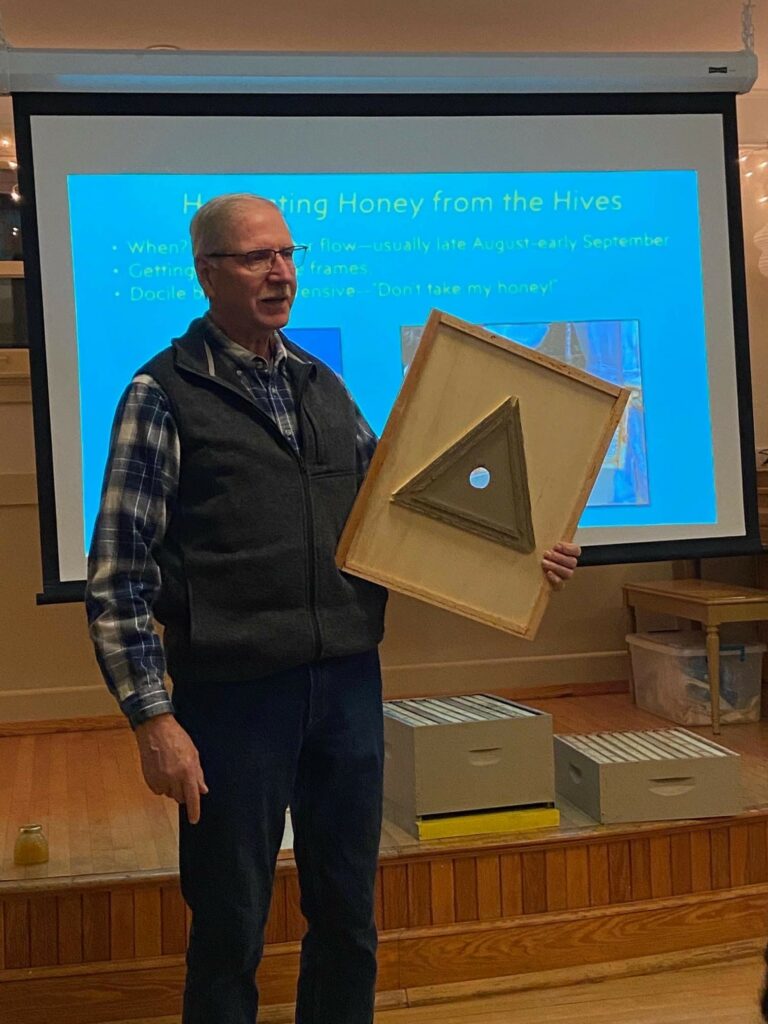Despite single-digit temperatures and feet of snow, nestled into the icy winterscapes of Michigan’s Upper Peninsula lay healthy, buzzing bee hives nourished by community-minded beekeepers.
Although much of the UP can be considered rural, the extreme weather conditions are anything but isolating, as folks, like bees, band together to survive hazardous winters. Your typical “yooper” won’t hesitate to pull your car out of a snow drift or give you the very shirt off their backs to help out, and it is no different within the beekeeping community.
Five beekeeping groups throughout the UP meet monthly with one goal in mind: to be a resource of knowledge for other beekeepers, both inexperienced and veteran. They are:
- Copper Country Beekeeping Club (Keweenaw Peninsula)
- Superior Beekeeping Club (Marquette)
- Bay De Noc Beekeeping Club (Escanaba)
- Northwoods Beekeepers (Iron Mountain)
- D & S Beekeepers (Sault Ste. Marie)

Support Your Local Pollinator
Though a well-pollinated garden and honey make good rewards, interest in beekeeping continues to grow as climate concerns steepen and people become more aware of the significance of the world’s pollinators.
Bees are a keystone species, meaning they are vital to our ecosystem: They pollinate growing fruits and vegetables, the plants that livestock eat, and the trees that provide the earth with oxygen. Bees are estimated to be responsible for at least ⅓ of the world’s food supply, yet researchers find that over 40 percent of bee species are vulnerable to extinction due to habitat loss, global warming, and pesticide use, as well as other anthropogenic causes.
In addition to keeping a species of native bee, you can help create a habitat for the bees in your area by planting native plants: In the UP, that includes flowers such as the Common Boneset and Smooth Aster.
3 Steps to Beekeeping Through Michigan Winters

Despite common misconception, bees do not hibernate. They cluster together to keep warm throughout the winter and actually flex their thorax muscles to create heat! Keeping your honeybees safe and snug over the winter involves three steps:
- Start preparing for the winter around the end of August, after the honey harvest. First, increase the sugar content in your bees’ sugar water syrup diet from a 1:1 ratio of sugar to water to a 2:1 ratio.
- Then, treat beehives for mites, a parasitic and invasive species. This is key for hive health over the winter.
- Then, wrap the hive in tar paper, foam, or “BeeCozy” (an insulated blanket that you can buy) to insulate the hive. Ventilation is also important. As you’re wrapping the hive for the winter, provide ventilation so the moisture doesn’t build up in the hive from condensation.
Find Your Mentor
Copper Country Beekeeping Club representative Pete Cattelino urges people to attend meetings even if they don’t have bees or are simply interested in beekeeping: “Starting up is a steep learning curve; that’s why it’s important to join a club and have a mentor. There are lots of start-up costs. Like any other hobby, you invest into it. Everybody starts out pretty simple and then decides how far they want to expand.”
“We have regular meetings every month with beekeepers from the area, experienced or newcomers, or people that are just interested,” Pete continues. “We have programs, time for discussion, and a Q&A. In the summer, we go out to someone’s apiary to see how other people are raising their bees.”
The Copper Country Beekeeping Club bridges the gap between those interested in beekeeping and those experienced in beekeeping in the Houghton/Hancock area and beyond, but Pete says every club in the UP stays connected: “We actually communicate with each other. We all work together.” In 2023, a region-wide beekeeping goal has already been met: Michigan State University Extension’s Ana Heck, one of the top beekeepers in the state, will speak in 4 areas in the UP this April.
A backyard beekeeper of 4 years, Pete’s favorite part of it all is harvesting the honey. Kids come from all over the neighborhood during this special time.
“If you keep going, it’s kind of addicting,” says Pete. “Once you learn about these creatures, they’re just fascinating. What they do is fascinating. They’re like livestock, really. You care for them, you keep them healthy, feed them, provide a safe environment, and they do their own thing. It’s worth the hard work, the expense, and the stings.”

Lily Venable is the Social Media Coordinator for Taste the Local Difference, and lives in the Keweenaw Peninsula.
